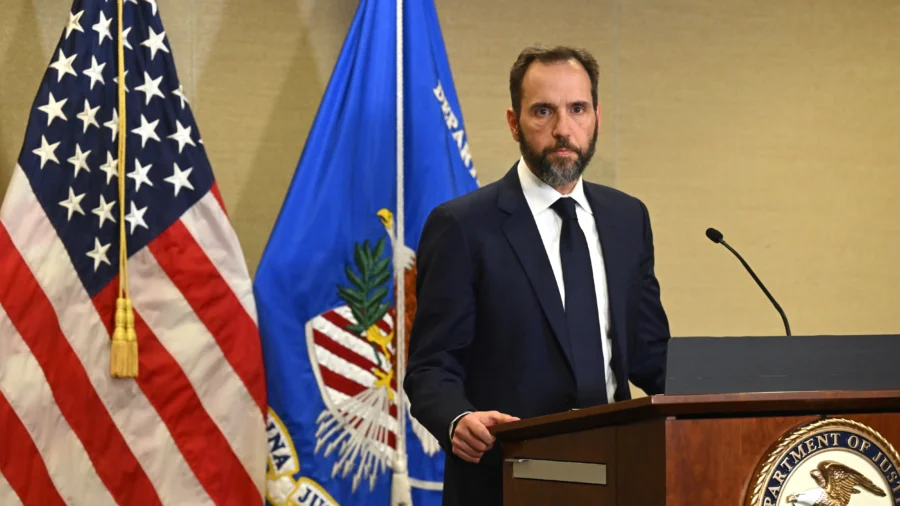FORT PIERCE, Fla.—U.S. District Court Judge Aileen Cannon heard arguments over special counsel Jack Smith’s appointment and the scope of his powers on June 21, as former President Donald Trump filed a motion to dismiss his classified documents case on the basis that the special counsel was unlawfully appointed, making his actions null and void.
In addition to Emil Bove arguing for the defense and James Pearce arguing for the prosecution, attorneys Matthew Seligman, Josh Blackman, and Gene Schaerr represented three groups of former government officials and legal experts who weighed in on the matter.
At the core of the defense’s argument is that the special counsel appointment violates the Appointments Clause, which states that officers need to be nominated by the president and confirmed by the Senate. However, it also allows Congress to enact laws that give department heads the authority to appoint inferior officers who report to the department head without such a confirmation process.
The defense argued Mr. Smith wields power exceeding that of an inferior officer and was thus an improperly appointed superior officer. The prosecution argued Mr. Smith was a properly appointed inferior officer working under the attorney general.
The judge raised questions about where the attorney general’s authority to appoint such an officer came from, and how much oversight he really has over the special counsel.
Where Is the Statutory Authority?
The attorney general’s appointment order of Mr. Smith cites several sections under 28 U.S. Code, which outline the function of the attorney general, delegation of authority, appointment of other officials, and rules governing attorneys retained by the attorney general.
Judge Cannon asked Mr. Pearce, where is the special counsel statute? She expressed concern that the prosecution was relying on a patchwork of statutes to claim authority.
Mr. Pearce argued that historical precedence supports this authority. Past attorney generals have appointed special counsel, and even presidents have exercised power over special counsel. Mr. Pearce argued that if the court has accepted that Congress has granted the attorney general authority to appoint inferior officers, there is no difference in whether the president or attorney general appoints the officer.
Amici in support of the defense had argued that past attorney generals had both properly and improperly appointed special counsel in the past. For example, if a U.S. Attorney—someone who had been through Senate confirmation—was appointed special counsel, this would not have violated the Appointments Clause.
Amici in support of the prosecution argued that Congress had vested in the attorney general authority to appoint inferior officers, such as the special counsel or the solicitor general.
Defense attorneys argued that just because the Justice Department has made unlawful appointments in the past does not justify an unlawful appointment now.
Mr. Bove argued all the statutes discussed came from a law enacted in the 1960s, and the section that defines “special attorneys” gives them a far narrower role than the “special counsel” today. In short, they are not special counsel statutes, the defense argued.
Does the Attorney General Have Oversight?
If the special counsel is an inferior officer, he would be beholden to a superior—the attorney general.
Mr. Pearce said that the attorney general has the power to rescind Mr. Smith’s appointment and to overrule decisions, leading the judge to ask for an example.
Judge Cannon asked whether there has been any oversight of Mr. Smith to date, and Mr. Pearce said he was not in a position to answer. The judge also asked whether the attorney general had oversight over the decision to bring an indictment; Mr. Pearce said he could not answer. He had earlier told the judge that the attorney general can review, but is not required to review, an indictment brought by special counsel under the department’s rules.
Judge Cannon asked why Mr. Pearce could not answer, as it should have been straightforward whether the attorney general oversaw the decision to indict or not. Mr. Pearce answered that a decision was made, but he wasn’t in a position to say how.
Amici had argued that this was not equivalent to oversight, because the attorney general overruling the special counsel would need to be prompted by some unethical action by the special counsel. Mr. Pearce said the attorney general did not need to be prompted by unethical actions to decide to overrule something.
There is no set timeline for Judge Cannon to issue her decision, but for some past motions to dismiss filed by the defense, she ruled promptly after holding a hearing.
From The Epoch Times

